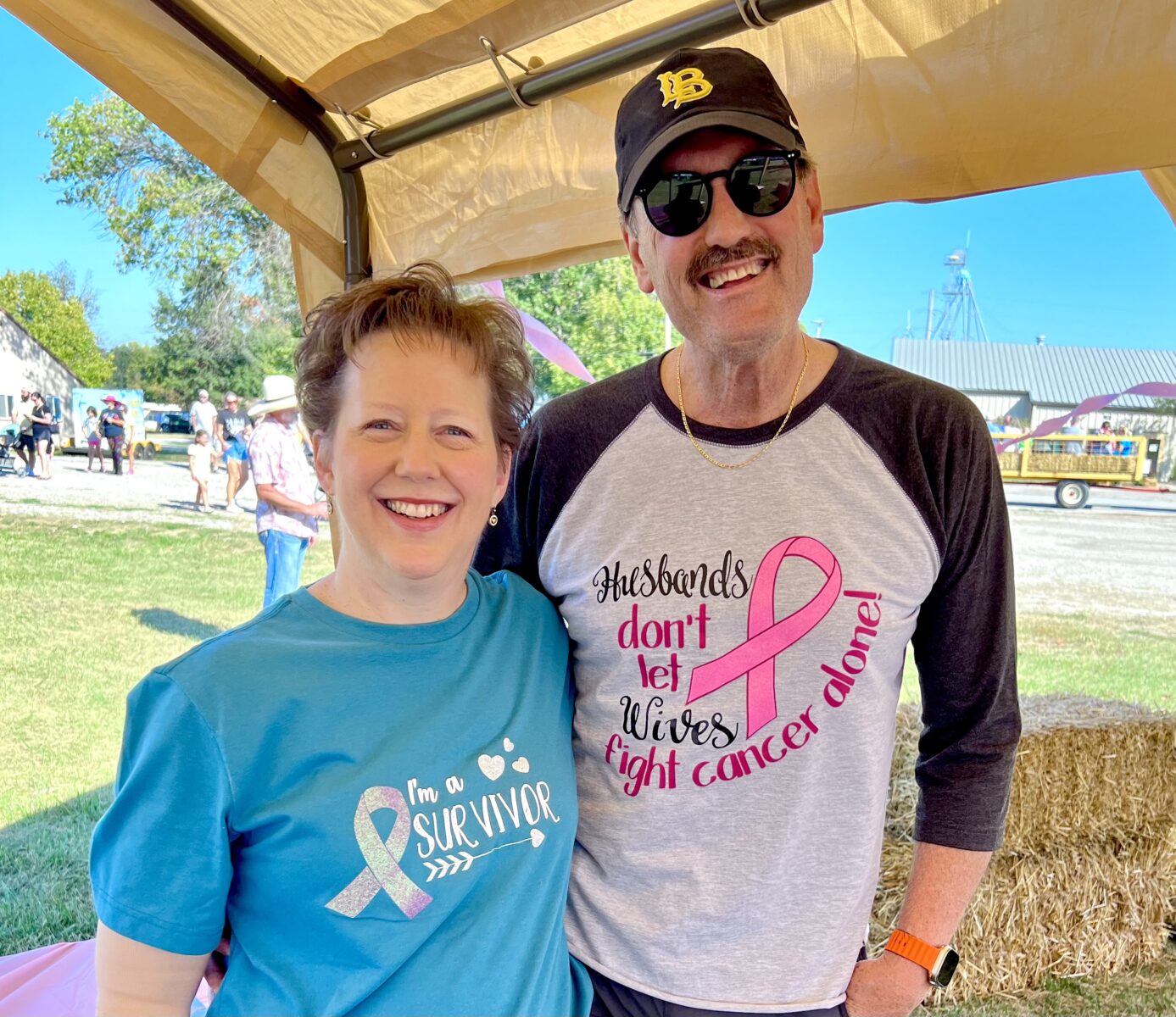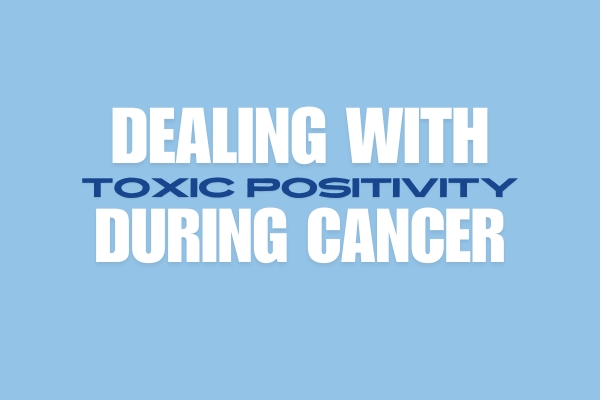Dealing with Toxic Positivity during Cancer
by Keith T. Hardeman
Since my wife Shelley began her breast cancer treatment, friends naturally ask for occasional updates. I’m happy to oblige, especially when there’s good news. If there’s nothing positive to convey, I still tend to be transparent with raw, unfiltered detail. It may be uncomfortable to hear, but most of them, thankfully, listen and empathize.
Sadly, a few others take an exasperatingly different approach and chastise us for disclosing treatment struggles. Those individuals push the idea that belief determines reality. Therefore, as far as they’re concerned, disclosing negative emotions will lessen our chances for survival. This imposition about the need to outwardly stay upbeat (thus internalizing our suffering) reflects a psychological issue called toxic positivity.

Pressuring cancer patients (or their spousal caregivers) for an improved outlook is a glib perspective to impose as we desperately struggle to navigate the storm of a life-threatening health crisis. Oncology truth reveals that a positive attitude does little or nothing to diminish ghastly side effects of treatment. Nor will it enhance survival prospects. What it actually does is make us feel invalidated. Or guilty.
One notable episode of toxic positivity took place when I bumped into Janice (not her real name) at a store one afternoon. Shelley and I knew her when our kids attended high school together years before. But we hadn’t seen her since then.
Ordinarily I would have enjoyed chitchatting with Janice, but I was tired. This was one of our bad days when Shelley had to stay home – when cancer treatment incapacitated her. Janice was probably unaware of Shelley’s condition anyway, so my goal was to avoid the topic, exchange some quick, obligatory pleasantries, and then head home to resume caregiving.
But Janice had other ideas and seemed fully intent on catching up. She smiled and energetically asked a slew of questions about our latest family ongoings. As I presumed, she had no knowledge of Shelley’s diagnosis. And I wanted to keep it that way.
Her persistence eventually wore me down, however, and I inadvertently blurted out the cancer news. Our talk would now be extended, as Janice understandably wanted more detail.
“Oh no!” she responded. “How’s she doing?”
She wanted to know. So I told her.
“I don’t know,” I said. “We’ve had some victories and setbacks, and today… well, today hasn’t been a good day.”
“But she’s gonna be OK, right?”
“Again, I don’t know,” I replied. “We’re seven months in, and she’s had a lot of chemotherapy, two surgeries, and we just started radiation. But the chemo didn’t get all the cancer, and she’ll need even more of it after radiation is done.”
Janice pondered for a moment. Then she oddly declared, “Keith, you guys need to be more positive than that.”
Excuse me?
While friends’ positivity messages are generally harmless, I’m still surprised whenever someone specifically pushes an upbeat mentality as their go-to antidote for our cancer agony. It’s indicative that many people just don’t understand how physically and emotionally cruel treatment can be.
Janice needed to be told that she crossed the line into insensitivity.
Janice obviously meant well and probably spoke without considering the stress of cancer-world imprisonment. But as I’d already told her, this was one of our bad days. Shelley woke up and her body was teeming with pain and fatigue. Meanwhile I was consumed with the associated anxiety. Advising us to have a better attitude on days like this is not only tone deaf, it’s plain silly.
“Cancer treatment has come a long way, so you have to stay positive,” she emphasized. “I’m sure she’s gonna be fine.”
“Well, I’m not trying to argue with you,” I mildly chuckled, “but you don’t know if that’s true. Obviously, we hope she beats this. But right now? We just don’t know.”
Clearly rankled by my refusal to embrace her optimism, Janice dug in her heels.
“Keith, that kind of negativity won’t help anything,” she reasserted. “A better attitude will help Shelley get better, and you should go home and tell her that right now!”
The intensity of Janice’s pushback was remarkable. I was even more astounded when I noticed she was shaking her finger while she lectured me about positivity: “You need to tell Shelley that my best friend with cancer had a good attitude, and that’s why she’s alive today!”
I was dumbfounded. She was basically saying the reason Shelley is having a rough go is that we’re not thinking about her cancer the right way.
As Janice went on about attitude, I stared into blank space. I saw the last seven months of gut-wrenching fallout from Shelley’s treatments flash, as they say, before my eyes.
The violent vomiting. The emotional impact she felt from hair loss. The numerous hours-long naps. The physical pain from surgeries and radiation. The sleep I’ve lost trying to manage clashing professional and caregiving responsibilities. And the resulting toll everything took on my own physical and emotional health.
On days like this one, when Shelley’s side effects are overwhelming, our emotions are often wobbly. Try as we may, we’re not always successful in containing our apprehensions and disappointments.
But, frankly, why should we need to in the first place?
Talking about dreadful treatment or a grim prognosis to someone who listens can be so psychologically affirming: It allows us to unload a bit of the pent up distress. And doing so is not exhibiting a bad attitude that needs to be “corrected.”
When Janice finished her little sermon, I thought about leaving right then. But I reconsidered. No, she doesn’t get to swoop in, belittle us for doing our best throughout this terrible ordeal, and then proudly walk away thinking she’d fixed our cancer problem. This was a perfect teaching moment. She needed to understand the harm she’d done as she crossed the line into insensitivity.
I explained that shaming a patient or spousal caregiver for not having a better outlook hinders our ability to cope.
“Janice, I know you’re trying to help,” I began, “but this is cancer, not a summer cold. It isn’t a psychological condition, and patients can’t magically think themselves into being cured.” That got her full attention. “Your friend survived because thankfully her treatment worked,” I said. “But if it hadn’t, her attitude wouldn’t have saved her. Shelley’s treatment hasn’t fully worked to this point, and we’re rightfully concerned.”
And second, I explained that shaming a patient for not having a better outlook hinders our ability to cope. If treatment side effects are unbearable (as they were this day), Shelley could inadvertently worsen things by presuming she’s at fault for an inability to muster the “right” attitude – when it’s medical technology that’s falling short. “That’s one hell of a lousy guilt trip when you essentially blame us for feeling miserable, today,” I said.
A few tears emerged in Janice’s eyes. To her credit, she didn’t double down on her “just be positive” rhetoric as she had a minute earlier. Instead, she listened, and she sincerely apologized. Her voice trembled while she walked back her narrative on attitude. “I’m just saddened that you’re so down,” she confessed.
I put my arm around her. “I know that, and I feel your support,” I said. “But feeling down comes with the cancer territory, and that’s just something you can’t fix.”
I must admit that my own pushback felt good. In fact, it felt empowering. And even more importantly, Janice appeared to learn a valuable lesson.
Perhaps we in the cancer community should start educating those who inexplicably insist on semantically transforming crappy into happy. Maybe it’s time to call them on their dismissiveness. Maybe we need to politely, but firmly, ask them to curb the toxic positivity and urge them instead to quietly listen – and let us experience the catharsis that venting those difficult feelings often brings. And maybe we need to enlighten them, if for no other purpose, so they won’t extend similarly indifferent sentiments to other poor souls suffering from the grip of cancer’s sheer terror. It seems to me that someone has to tell them to stop. If we don’t, who will?
It’s been about six years since that conversation with Janice occurred. Though our paths haven’t crossed again, I’d still like to think I helped her in the long run. Let’s consider helping others like her. They are genuinely trying to help us, after all.
Keith T. Hardeman is professor emeritus at Westminster College in Fulton, MO. He is the author of Don’t say “Everything happens for a reason”: What patients and caregivers want friends to know about helping them through the horrors of cancer. He is also the author of The shadow of trepidation: Reflections on caregiving during my wife’s battle with breast cancer. His wife, Shelley, is currently in remission.


